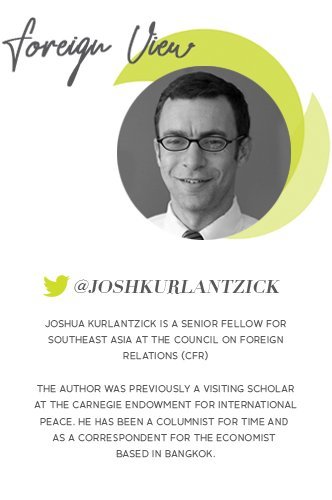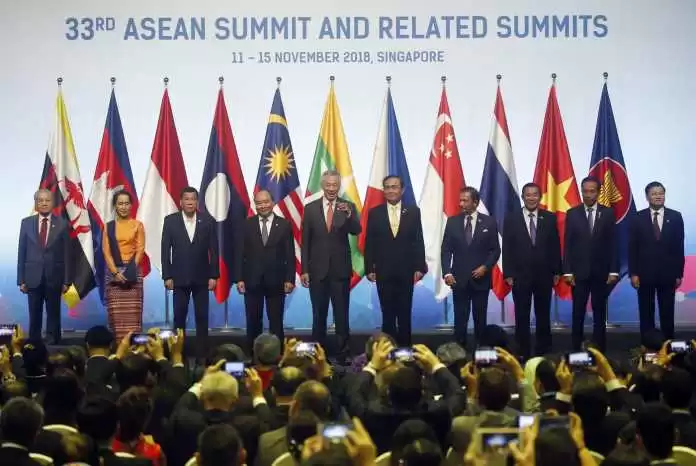 [dropcap]2[/dropcap]018 was a brutal year, in many ways, for civil society activists, rights advocates, and democratic politicians throughout Southeast Asia. Cambodia’s government transformed from an autocratic regime where there was still some (minimal) space for opposition parties into a fully one-party regime. Thailand’s junta continued to repress the population, attempting to control the run-up to elections still planned in February 2019. The Myanmar government continued to stonewall a real investigation into the alleged crimes against humanity in Rakhine State, despite significant international pressure to allow an investigation.
[dropcap]2[/dropcap]018 was a brutal year, in many ways, for civil society activists, rights advocates, and democratic politicians throughout Southeast Asia. Cambodia’s government transformed from an autocratic regime where there was still some (minimal) space for opposition parties into a fully one-party regime. Thailand’s junta continued to repress the population, attempting to control the run-up to elections still planned in February 2019. The Myanmar government continued to stonewall a real investigation into the alleged crimes against humanity in Rakhine State, despite significant international pressure to allow an investigation.
And even in Indonesia, one of the freest states in the region, the Jokowi government has given off worrying signs of increasingly authoritarian tendencies. Jokowi has politicized top law enforcement posts, overseen criminal investigations of opponents, and shown other worrying signs, according to an analysis of his growing authoritarianism published in New Mandala by Tom Power, a PhD candidate at Australian National University. (Malaysia is a rare bright spot for rights and democracy in Southeast Asia this year—in fact one of the few global bright spots for democracy in 2018.)
Perhaps nowhere has the increasing crackdown on rights and freedoms in Southeast Asia been more visible than in the area of press freedom. Of the journalists featured on Time magazine’s series of covers of people of the year for 2018, three are from Southeast Asia. Two of those featured are Wa Lone and Kyaw Soe Oo, journalists for Reuters who have been jailed in Myanmar, essentially for investigative reporting into aspects of a massacre against the Rohingya. (They are officially charged with breaking the Official Secrets Act.) The two men have already been in jail for a year—despite their trial being decried as a sham by rights organizations and prominent rights advocates—and they face in total seven-year prison sentences.
Suu Kyi has defended their jailing, and the two reporters’ time in prison is emblematic of Myanmar’s worsening climate for independent journalism, even under Suu Kyi’s government. As the Committee to Protect Journalists (CPJ) has noted, three other Myanmar journalists were arrested in October, and overall the Official Secrets Act, defamation charges, and physical threats are chilling the climate for reporting in the country.
The climate for press freedom is poor in Cambodia, Laos, Thailand, and Vietnam as well. For example, in Cambodia, one of the leading print outlets, the Cambodia Daily, closed in 2017, reportedly under pressure from the Hun Sen government. Another leading independent outlet, the Phnom Penh Post, was sold to a new owner in 2018, amid worries that the new management would curb critical and investigative reporting. Many Phnom Penh Post staff members quit. Meanwhile, in Vietnam the government continued to aggressively shut down independent bloggers and writers, and Thailand’s junta has continued to harshly repress reporters and editors, such as reportedly pushing for the sacking of the top editor of the Bangkok Post, a leading Thailand newspaper, for his critical coverage of the military regime.
Maria Ressa, the head of Rappler, one of the Philippines’ toughest and most groundbreaking news sites, is probably the best-known case of press freedom under attack in Southeast Asia. Before becoming the CEO of Rappler, Ressa had amassed a broad range of experience, including working for two decades for CNN, for whom she covered everything from the rise of Islamist terror networks in Southeast Asia to the post-Marcos era in the Philippines. She has received a wide range of awards for her work, including an Emmy nomination and an Overseas Press Club award.
Like many authoritarian-leaning populists, Duterte aggressively demonizes the media, and Rappler in particular seems to infuriate him, with its hard-hitting, deep-digging style. The Duterte administration seems determined to put Rappler out of business. In early 2018, the Philippine SEC announced that it was revoking Rappler’s license. The media organization fought, and continued operating, but it was then accused of libel by the Philippine national bureau of investigation, and then was hit with tax evasion charges by the Philippine tax agency.
Ressa herself also was charged with tax evasion, only a few days after she got a press freedom award from CPJ. She and the media outlet deny the charges, and noted how quickly the Philippine government had moved to file charges, seemingly without considering all motions and evidence. The case is now proceeding—but the climate for press freedom in the Philippines, which long combined tough investigative reporting with one of the most dangerous environments for journalists in the world, looks like it will only get grimmer in 2019.
In addition to regression on the issue of press freedom, Southeast Asia witnessed backsliding on rights and freedoms in many other areas in 2018, with Malaysia as a notable exception to this trend.
Cambodia, the Philippines, Thailand, Myanmar, and even Indonesia exemplified a continued democratic regression. Cambodia destroyed all opposition, although at the end of the year Hun Sen and the CPP, under pressure from foreign governments, slightly relaxed their pressure on the opposition and civil society. However, this relaxation was probably just a means of convincing major foreign donors not to impose tougher sanctions against Cambodia, and not really a shift in how Hun Sen treats the opposition or civil society.
Meanwhile, the Thai junta did everything it could to prevent real political opposition from coalescing. It banned political parties from organizing for most of the time before the February 2019 elections, putting most parties at a disadvantage before the election. The ban was only lifted in December.
In the Philippines, President Rodrigo Duterte cracked down hard on press freedoms. But he also appears to be trying to intimidate other journalism outlets, and has floated plans of launching more extrajudicial killing squads, in addition to those already tasked with wiping out drug suspects – these new squads would purportedly attack anyone linked to a communist insurgent group. Duterte also continued to weaken the independence of the judiciary and the power of the political opposition.
In Laos, where the country’s new leadership has promised to take tough measures to root out graft, there are signs of progress on fighting corruption, including the firing of two provincial governors alleged to have been involved in corruption. But overall, the anti-corruption campaign has made modest inroads at best, and promises by the new leadership to bolster transparency and accountability have had no real effect on what remains a highly authoritarian and opaque government.
And in Myanmar, the National League for Democracy/Aung San Suu Kyi government has proven a massive disappointment, overseeing stalled democratic reforms, regression on press freedoms, and a scorched earth policy toward the Rohingya in western Myanmar.
However, 2019 might not be so grim for rights and freedoms in Southeast Asia. Although Thailand’s junta has tried to stage-manage elections called for February to ensure that the outcome is favorable to the military – and possibly even one resulting in a former general as prime minister – it cannot completely control the actual election.
There is considerable reason to believe that, although the election will not be totally fair – the military is trying to slant the playing field against the long-ruling Puea Thai party – the actual Election Day will be free, marking some progress after nearly five years of military rule. In addition, an election brings some degree of uncertainty, and there is a chance that the vote will result in a parliament that has real authority and popular legitimacy and puts the country back on the path to democratic rule.
There are other potentially hopeful signs in 2019 for rights and freedoms in the region. An election in Indonesia could showcase continued democratic consolidation there, even despite Jokowi’s increasingly authoritarian actions in the past year, and his selection of a cleric as running mate who has, in the past, made harsh statements about a range of minority groups in Indonesia. Malaysia’s government, which has made a strong start on democratic reforms, needs to move quickly to reform the country’s institutions, and set the stage, via legislation, for making lasting inroads against graft. In 2019, the Malaysian government has a chance to push through serious reforms designed to battle corruption, improve government transparency, and protect civil society, showcasing real democratic progress.
This article was originally published by the Council on Foreign Relations and can be accessed at:
https://www.cfr.org/blog/southeast-asia-recap-2018-democracy-continues-suffer
https://www.cfr.org/blog/2018-review-press-freedom-under-assault-southeast-asia-maria-ressa-and-more
Creative Commons: Some Rights Reserved




